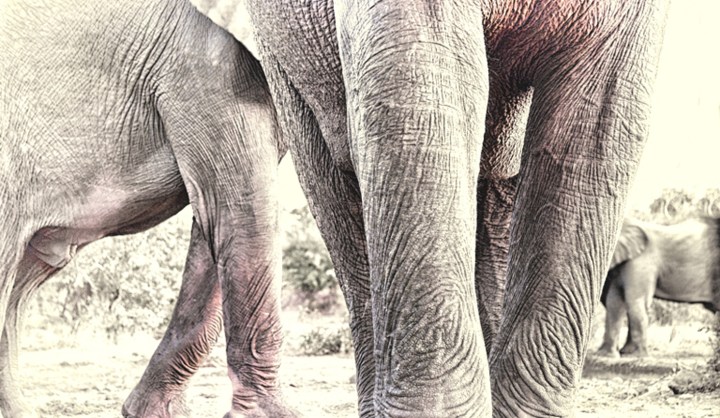Africa
Hunting desert elephants for meat raises a storm – and denials

To see the desert-adapted elephants of Namibia's north-eastern Kunene region, you have to travel far over rough roads, be patient and trust your luck. The sight of these gaunt, highly intelligent animals trailing down a dry riverbed is one of the country's great wildlife experiences. But these animals are increasingly under threat: political, environmental, and, of course, from hunting. By DON PINNOCK.
A report that hunting permits had been issued for six of these bulls to be killed for meat in exchange for villager votes in favour of the ruling party, SWAPO, was, if true, bound to raise a storm of protest from conservationists worldwide. The country’s national elections take place in November and the ruling party is said to have little support from isolated communities in Damaraland and Kaokoland, which receives minimal assistance from the central administration. In an unsigned but widely circulated article, it was alleged that from the six elephants shot, each person in the region would receive about US$1 worth of meat.
According to the article, the meat-for-votes deal was made against the advice of qualified scientists and conservationists working for the protection of the desert elephants. A spokesperson for the Namibian Ministry of Environment and Tourism (MET), Romeo Muyunda, confirmed the permits had been issued, saying: “The local people need to benefit from the elephants in some way or another, or they will begin poaching them,” but declined to comment further.
Seemingly stung by the storm of protests, the Ministry issued a press release urging the public to “ignore these inaccurate, false reports and assumptions on our elephants and sustainable utilisation practices,” and threatened “illegal” NGOs “working against the wildlife conservation activities of the government” to “refrain from this irresponsible behaviour before action is taken.”

However, the press release does not refute the issue of hunting permits, attempting instead to show that there is no such thing as desert elephants, claiming they are normal African elephants adapted to living in desert conditions. Because of this and because the elephant population as a whole in Namibia is healthy, the Ministry says “sustainable utilisation” is therefore good conservation practice.
The press release, rather ominously, then notes the need to cull “problem” elephants and points out that trophy hunting “has grown to be one of the most important industry (sic) in Namibia in terms of its strong contribution to the Gross Domestic Product, employment creation and the well-being and social upliftment of our rural people.”
According to Laura Brown, Director of Desert Lion and Elephant Conservation, desert elephants are unique in that they have adapted to extreme fluctuations in the desert climate where the annual rainfall is below 100mm a year. Although there are no known genetic adaptations to desert dwelling, she says, their learned behaviour has enabled them to master the art of survival in this harsh environment.
The government insists that there is no problem with the size of the population and claims that there are around 300 desert-adapted elephants in the Kunene region. Conservationists, however, estimate that there are no more than 100 and only about 18 mature bulls, for which hunting permits are claimed to have been issued for six.

According to Brown, with elephants there is normally a one-to-one male-to-female ratio. But poaching, destruction of natural habitat and over-hunting among desert elephants has reduced a ratio to about one male to 13 females. “This decline destroys the social cohesion between the animals, which in turn makes the whole herd become more aggressive and restless. It depletes the gene-pool, exposing this unique population to inbreeding and the last of only two desert-adapted elephant populations (the other is in Mali) to the threat of extinction.”
Efforts to buy the hunting permits to keep the elephants alive have been unsuccessful. Basil Calitz, Tour Operator and Lodge Owner in Uis, approached Nick Nolte Hunting Safaris, who is said to own one of the permits, with an offer to purchase, but was told the Namibian Government would not allow it. Anton Louw from Live Trophy confirmed that he also approached the government with an offer to buy the permits and replace the elephant meat with beef.
“We note with regret that hunting permits have been issued,” he said. “We confirm that we are offering to buy the permits as well as to supply an equal measure of meat. We are prepared to assist in establishing sustainable food production initiatives to support the affected communities.” The offer has been ignored. DM
Photos by Don Pinnock.

















 Become an Insider
Become an Insider